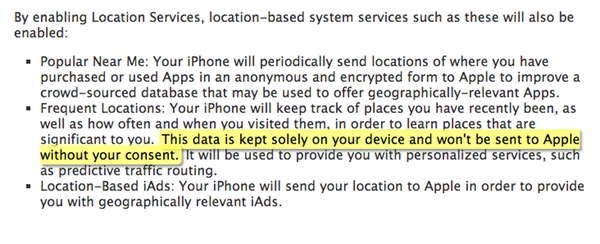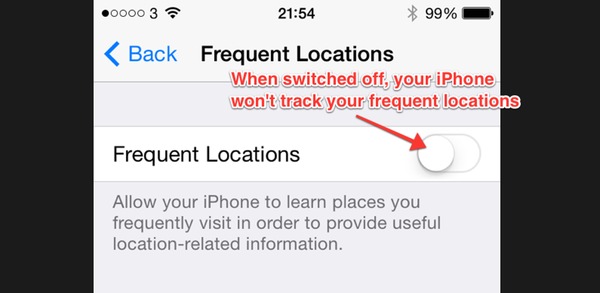Apple Denies Chinese Media Claims that iPhones are a “Threat to National Security”
Posted on
by
Graham Cluley
![]() Just how dangerous is the Apple iPhone?
Just how dangerous is the Apple iPhone?
If you believe reports from some of China’s media outlets, then very dangerous indeed.
As Reuters reports, Chinese state-run TV station CCTV aired a report last Friday claiming that the iPhone’s “frequent locations” feature in iOS 7, which tracks owners’ locations and could help the US government secretly gather information about the Chinese economy and “even state secrets.”
Apple’s own blurb about its Location Services functionality freely admits that Frequent Locations keeps track of places you have visited, but asserts that it is stored solely on the iPhone itself and not shared with Cupertino without consent.

Frequent Locations: Your iPhone will keep track of places you have recently been, as well as how often and when you visited them, in order to learn places that are significant to you. This data is kept solely on your device and won’t be sent to Apple without your consent. It will be used to provide you with personalized services, such as predictive traffic routing.
To be fair, it’s not just the Chinese media who have highlighted concerns about the iPhone collecting details of your frequent locations. There are umpteen US media reports that have also run stories on the issue, including this one from NBC Action News:
The bad news is that most people don’t know anything about the Frequent Locations feature, let alone that Apple has enabled it by default. The good news is that it’s not that tricky to enter your iPhone’s settings and disable the feature if you find it creepy.
How to Turn Off the iPhone Frequent Locations Feature
Here’s how you disable the feature, buried deep within your iOS settings:
- Click on your Settings app.
- Click on Privacy.
- Click on Location Services.
- Here you can choose which apps should be allowed to use Location Services. Make sure to review the list so you’re comfortable with what app can know where you are.
- Our work isn’t done. Scroll right to the bottom…
- You should now see Frequent Locations. They hid it well didn’t they?
- Click on it.
- You should now be able to toggle whether you want Frequent Locations turned on or off

And if you’re concerned that you might lose out by turning off the feature, don’t be too worried. I’ve always had Frequent Locations turned off on my iPhone, and I have never felt like I have missed out on any functionality as a result.
For its part, Apple issued a statement debunking the Chinese report, underlining that it does not collect private information and has never opened a “backdoor” to any government agency for data collection, and clarifying why it has the Frequent Locations feature:
Calculating a phone’s location using just GPS satellite data can take several minutes. iPhone can reduce this time to just a few seconds by using pre-stored WLAN hotspot and cell tower location data in combination with information about which hotspots and cell towers are currently being received by the iPhone.
In order to accomplish this goal, Apple maintains a secure crowd-sourced database containing known locations of cell towers and WLAN hotspots that Apple collects from millions of Apple devices. It’s important to point out that during this collection process, an Apple device does not transmit any data that is uniquely associated with the device or the customer.
I have to admit, I tend to suspect that Apple is telling the truth here. Although it can be a bit creepy how Frequent Locations keeps a record of your movements, I can see how it could be useful for providing traffic information and other personalisations. Personally, I’m happy to live without that additional assistance, and so turn the feature off – but that doesn’t mean that I believe Apple is using the data to snoop on me.
This is Not about Apple – It is about China and the USA
So, why did CCTV – something of a mouthpiece for the Chinese government – make its seemingly hyperbolic claims about iPhones being a threat to national security?
Well, one possibility is that the Chinese were fighting back after recent American media reports about China’s hacking and spying activities on the United States.
A couple of days before the CCTV report, the New York Times published an article claiming that Chinese hackers had broken into US government networks earlier this year, and accessed the personal information of all federal employees.
A Chinese foreign ministry spokesperson retaliated, claiming that the US government had insufficient evidence to point the finger of blame at his country’s government.
 At about the same time, prosecutors in Los Angeles unsealed a complaint accusing Su Bin, a Chinese citizen living in Canada, of hacking into the computer systems of US defense contractors Boeing and Lockheed Martin to steal sensitive details of military projects including the F-22 and F-35 fighter jets.
At about the same time, prosecutors in Los Angeles unsealed a complaint accusing Su Bin, a Chinese citizen living in Canada, of hacking into the computer systems of US defense contractors Boeing and Lockheed Martin to steal sensitive details of military projects including the F-22 and F-35 fighter jets.
In short, the Chinese authorities were feeling the heat with some pretty serious accusations of hacking and internet spying pointing in their direction.
In the world of international tit-for-tat accusations and diplomatic jostling, is it any surprise then to see the Chinese state media take a potshot at Apple, US technology’s shining star, which has been putting considerable resource into cracking the Chinese market?
What better way to send a warning shot across America’s bows than to broadcast a message to millions of potential iPhone purchasers in China that the devices cannot be trusted, and that buying one might even be unpatriotic?
By the way, in case you were wondering. Yes, there is some irony in the Chinese TV company that is claiming Apple is involved in surveillance being called CCTV… But I’ve chosen to ignore it. 😉